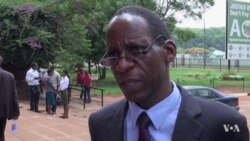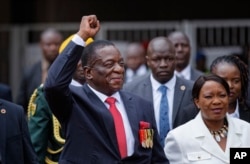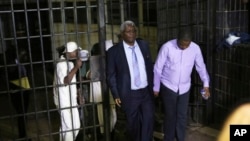For 37 years under the iron-fisted rule of Robert Mugabe, Zimbabwe has been battered by human rights abuses, endemic corruption, and mismanagement that sank the economy and reduced the nation’s once-strong agricultural sector to ruins.
The nation’s new president, Emmerson Mnangagwa, sees only one way forward for his wounded nation: forgiveness.
“I thus humbly appeal to all of us that we let bygones be bygones," he said in his inaugural address last week, in which he described Mugabe as a mentor and father figure.
Mugabe's government, in which Mnangagwa served as vice-president, was repeatedly accused of rigging elections, using force against opposition parties, jailing, beating and torturing critics, and other human rights violations. Endemic corruption grew especially intense after diamond fields were discovered in 2006.
Tuesday, Mnangagwa announced his government would allow a three-month amnesty for those willing to return state funds they took during the previous administration.
"Upon the expiry of the three-month window," his edict read, "Government will proceed to effect arrest of all those who would not have complied with this directive."
But just a day after the new president urged his nation to let go, the state jailed former Mugabe-era minister Ignatius Chombo on massive corruption charges. He is one of several Mugabe cronies to face what some critics are saying is political retribution, not true justice.
Equal justice?
Constitutional scholar Lovemore Madhuku is representing Chombo. He spoke to VOA outside the Harare Magistrates’ Court this week.
“I think that they are just using [Chombo] to try and portray an image of dealing with corruption and so forth. But the cases that my client is facing, these are very old cases,” he said. "...It’s just to harass him and try to create an impression that we are dealing with corruption.”
Human rights lawyers say there are worse crimes, and more serious culprits, who are being protected.
Renowned Zimbabwean human rights lawyer Beatrice Mtetwa told VOA she fears justice is not being applied equally. “If there are crimes that are being committed, everybody should in fact be put on trial,” she said. “It shouldn’t be selective at all. It shouldn’t depend on which faction you belong to, are you on our side, or the other side.”
Activist Patson Dzamara’s older brother Itai was abducted in 2015 for opposing Mugabe. He is still missing, and Dzamara told VOA he believes these high-profile trials are not targeting the real crimes. He says he’s angry, and wants accountability.
“The current president, Emmerson Mnangagwa, played a very major role,” he said. “And so he’s complicit. He is, or he was, a part of that arrangement in government. And for us to sweep that under the carpet, and say that was that and life just has to go on as though nothing happened, I don’t think it’s proper.”
Church role
At the Life and Liberty Church Zimbabwe, in central Harare, Bishop Noah Pashapa says he wants to encourage forgiveness, but understands why some people are not ready for it.
“I have not experienced what they experience that has gotten them to that place of finding it difficult to forgive,” said Pashapa, who says he led a delegation of church leaders to advise Mnangagwa on his inaugural address. “So I will appreciate how they feel and I will respect how they feel. And yet, I will seek to appeal to them to appreciate that, these things do happen. ... Sadly, wherever we human beings struggle for power, they do bad things to each other.”
Pastor Chris Oparoacha says he looks to other African nations for guidance, like Zambia.
“Chiluba, who was the outgoing president, was not given any immunity. He had to pay for the crimes that he did," Oparoacha says. "He might not be sentenced to prison, but whatever evil has been done, should be brought to light so those people are dealt with.”
There is, scholars agree, no clear way forward that will make all Zimbabweans happy. Justice and forgiveness, as many other African nations have learned, is a slow and complicated process.
South Africa’s post-apartheid Truth and Reconciliation Commission has come under criticism for being too easy on perpetrators and failing to adequately compensate victims. Sierra Leone’s post-war Truth and Reconciliation Commission worked in theory, scholars said, but the government failed to completely implement the commission’s recommendations.







